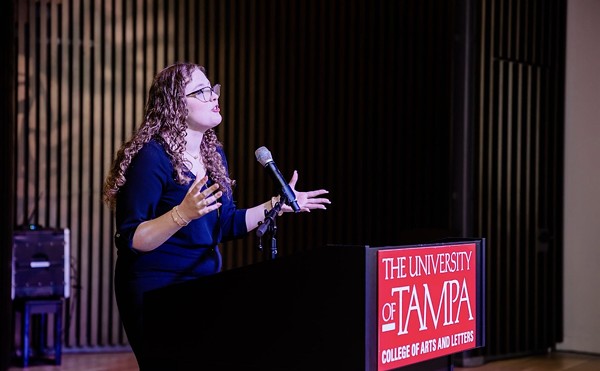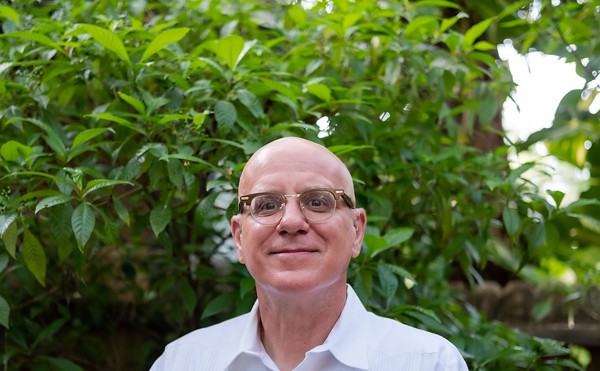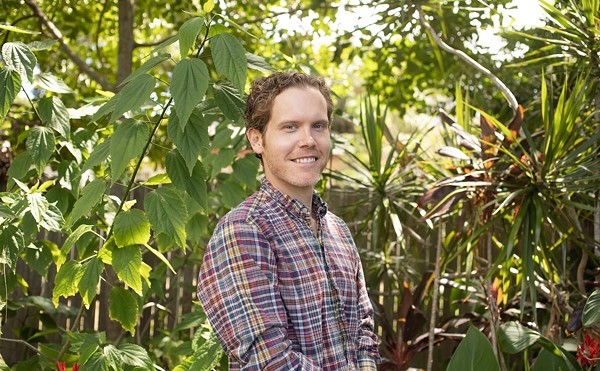It's sprawling and it's ambitious. For some, it will no doubt be received as a silly, bloated exercise. For those open to its passionate storytelling, to its embrace of the transcendence of storytelling itself, Cloud Atlas is at times a tremendously moving film. A film that, whatever its flaws, resonates with universal themes and benefits from the sincere way in which it presents them.
Cloud Atlas is not content to be a mere drop in the ocean of movies, to appropriate a metaphor the film employs. It segues from story to story — six in all — each told in a separate time. Ideas of eternal recurrence link each of the sections, with characters sometimes offering narrative or dialogue to guide the viewer. In theme, Cloud Atlas is very much a fusion of the sensibilities observed in previous films by the Wachowskis (The Matrix) and Tom Tykwer (Run Lola Run) — the idea of hidden truths, and the way that single acts and chance moments can alter how time unfolds, are top of mind here. During this sometimes-dazzling ride in support of those themes, Cloud Atlas shows the romance of same-sex love and rails against a world that reduces the mass of humanity to consumers, a world that uses violence to suppress and deceptive surfaces to control. It's about fighting the evil of those who accept injustice because that's "the natural order of things," to quote one character. It’s a call against close-mindedness, against living in fear.
The way the movie begins, thrusting viewers into a series of stories, is jarring. But once Cloud Atlas hits its rhythm and its themes clarify, it becomes engrossing. Separately, each of the tales feels familiar — the '70s potboiler, the futuristic, dystopian sci-fi, the 19th-century sailing adventure, etc. There isn't a cause-and-effect relationship among all the episodes, at least not one I could discern on this first viewing. But they are linked by telling the same kind of story — of the oppressed rebelling against their oppressors. The backdrop for each of these power struggles includes slavery, consumerism, corporate greed, and personal rivalry. One character's dialogue — such as Doona Bae's grand speech from the Neo Seoul section — resonates while images from the other stories are shown.
In what I take as an emphasis on the idea of a recurring soul, and a celebration of storytelling itself, the same actors play characters across each time period. Your reaction to this may well depend on how you take seeing Tom Hanks in so many guises that it's like The Polar Express all over again. I couldn't help but experience an intended sense of fun in watching the actors play characters across the centuries — noticing them within the roles is welcome here because this movie is about the power of storytelling as much as it is a movie that tells a series of stories.
Cloud Atlas clearly believes in the importance of stories in our lives, with characters either reading or watching the stories from one of the other segments. They then learn and take something from those stories — be it inspiration, curiosity, or confusion. To paraphrase one character: If just one person hears a story and discovers a truth, it has made a difference.
This is not mind-blowing, gonzo stuff where the artifice overwhelms the art. Each section is played true to its genre. Whether you like it may depend on your tolerance for the ripe mystical dialogue about how our lives extend beyond us. The symbol of a streaking comet birthmark, seen on characters in each of the time periods, emphasizes the idea that we are connected, that we are here for a short time and yet live beyond ourselves and beyond our mortality. That we have the chance to shine very brightly, like those who came before us, just like those who come after us will have that same opportunity. While there's a New Age-y element to this, there's also a very practical "what we leave for future generations" message.
Some will engage Cloud Atlas as dippy stuff. But there's nothing dippy about the need to fight against oppression, to fight against those who would hide the truth — especially not in such a passionate and often beautifully rendered film.


















